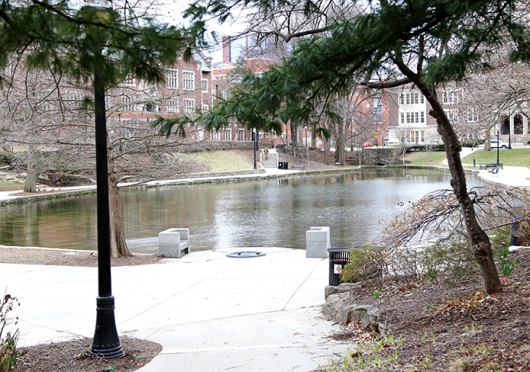Mirror Lake to be drained, surrounded by fences again
Mirror Lake is set to be fenced off starting on Monday as work begins once again to make the campus landmark more sustainable.
A well was drilled and tested as a part of a sustainability study that concluded last year, Dan Hedman, spokesman for Administration and Planning, said in an email. He added that the drilling of the well and the testing of the water cost $56,000.
The university is now investing in infrastructure so the groundwater well can be a long-term solution for the lake, Hedman said.
The project involves draining the lake again and installing pumps, meters and underground piping from the well to the lake.
The lake was drained after the 2013 Mirror Lake jump to allow for work on a sustainability study aiming to prevent water loss because of leaks in the lake’s structure. The study was also set to address maintenance issues related to deterioration of the lake’s walls.
The lake was refilled in August.
This phase of the project is set to cost $160,000, Hedman said, funded by Administration and Planning.
The work is set to be completed in May, depending on the weather, Hedman said.
“As always, we consider all factors related to the timing and realize there is never a perfect time to conduct this type of work on a popular campus feature. However, enhancing the sustainability of Mirror Lake is extremely important to the university’s long-term efforts,” Hedman said.
OSU had previously been using nearly 50,000 gallons of city water to fill Mirror Lake. Once the infrastructure for the permanent well is in place, Hedman said, it could save the university about $40,000 per year.
Last year’s sustainability study determined groundwater was a viable option for sustaining the lake, Hedman said. The study aimed to enhance the lake’s sustainability and safety.
The sustainability study cost about $28,000, Hedman said. As another result of that study, gravel was poured into Mirror Lake last May to reduce its overall depth to 5 feet to use less water and make the lake more sustainable, Hedman said.
Entire article:
http://thelantern.com/2015/03/mirro...al&utm_source=twitter.com&utm_campaign=buffer








